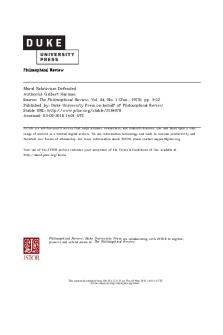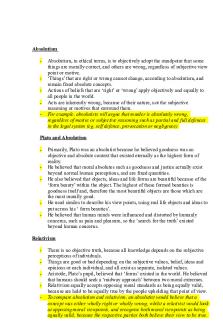Ethnocentrism and Cultural Relativism PDF

| Title | Ethnocentrism and Cultural Relativism |
|---|---|
| Course | Introduction To Cultural Anthropology |
| Institution | Truckee Meadows Community College |
| Pages | 2 |
| File Size | 59.1 KB |
| File Type | |
| Total Downloads | 63 |
| Total Views | 152 |
Summary
I compare and contrast ethnocentrism and cultural relativism. The teacher was kerri Lesh....
Description
Julia Cosby 10 February 2020 Kerri Lesh Anthropology 101 Ethnocentrism and Cultural Relativism Ethnocentrism would be defined as “the tendency to view one’s own culture as most important and correct” (Brown et al. 25). This concept is countered by cultural relativism, which is “the idea that we should seek to understand another person’s beliefs and behaviors from the perspective of their own culture and not our own” (Brown et al. 25). These two thought processes are very different from each other, but they both come into play when we consider the beliefs and habits of another group of people. If I were a court judge who needed to make a verdict on Baker and Jepsen’s case, an ethnocentric interpretation of the parents’ actions would look similar to the outcome that was portrayed in the scenario. In my American based culture, it is not acceptable to leave a baby unattended. Additionally, it is not acceptable to allow a baby to be cold because I feel they would get sick. With an ethnocentric mindset, my first reaction would be to immediately question the aptitude of this child’s parents. I would feel that the child needs to be placed with a caretaker who would not jeopardize the child’s health. My ethnocentric ruling would be to separate the baby from Baker and Jepsen and charge them with a misdemeanor for child endangerment/neglect.
If I were to look at this same case with a culturally relative perspective, I would actively listen to Baker and Jepsen’s point of view when I ask them to defend their case. I would do this with the goal to understand their perspective. When they tell me that in their Danish culture that doing this is completely normal, I would encourage them to elaborate so I can get a full and complete perspective. I would learn that their culture believes that leaving a baby in cold air is truly the best thing to do for their health and no longer wish to charge them with child endangerment or neglect. Simply because my American culture says that it is not okay to do this does not make it wrong. My culturally relative ruling would be not guilty. Upon reflection, my initial personal reaction to the scenario was towards the ethnocentric perception. The article at the beginning was phrased in a way that barely brought up culture, so I was unaware that leaving a baby outside had anything to do with culture. I unknowingly made an automatic connection in my brain with my own American culture and reacted in a shocked way. However, after reading further, I was introduced to several more concepts from the Danish culture’s perspective and I began to change to a culturally relative perspective.
Citations Brown, Nina, et al. Perspectives: an Open Invitation to Cultural Anthropology. American Anthropological Association, 2017....
Similar Free PDFs

Ethnocentrism - Sadiwa
- 62 Pages

PSYCH 620 Ethnocentrism
- 9 Pages

Harman Moral Relativism(excerpt)
- 7 Pages
Popular Institutions
- Tinajero National High School - Annex
- Politeknik Caltex Riau
- Yokohama City University
- SGT University
- University of Al-Qadisiyah
- Divine Word College of Vigan
- Techniek College Rotterdam
- Universidade de Santiago
- Universiti Teknologi MARA Cawangan Johor Kampus Pasir Gudang
- Poltekkes Kemenkes Yogyakarta
- Baguio City National High School
- Colegio san marcos
- preparatoria uno
- Centro de Bachillerato Tecnológico Industrial y de Servicios No. 107
- Dalian Maritime University
- Quang Trung Secondary School
- Colegio Tecnológico en Informática
- Corporación Regional de Educación Superior
- Grupo CEDVA
- Dar Al Uloom University
- Centro de Estudios Preuniversitarios de la Universidad Nacional de Ingeniería
- 上智大学
- Aakash International School, Nuna Majara
- San Felipe Neri Catholic School
- Kang Chiao International School - New Taipei City
- Misamis Occidental National High School
- Institución Educativa Escuela Normal Juan Ladrilleros
- Kolehiyo ng Pantukan
- Batanes State College
- Instituto Continental
- Sekolah Menengah Kejuruan Kesehatan Kaltara (Tarakan)
- Colegio de La Inmaculada Concepcion - Cebu












